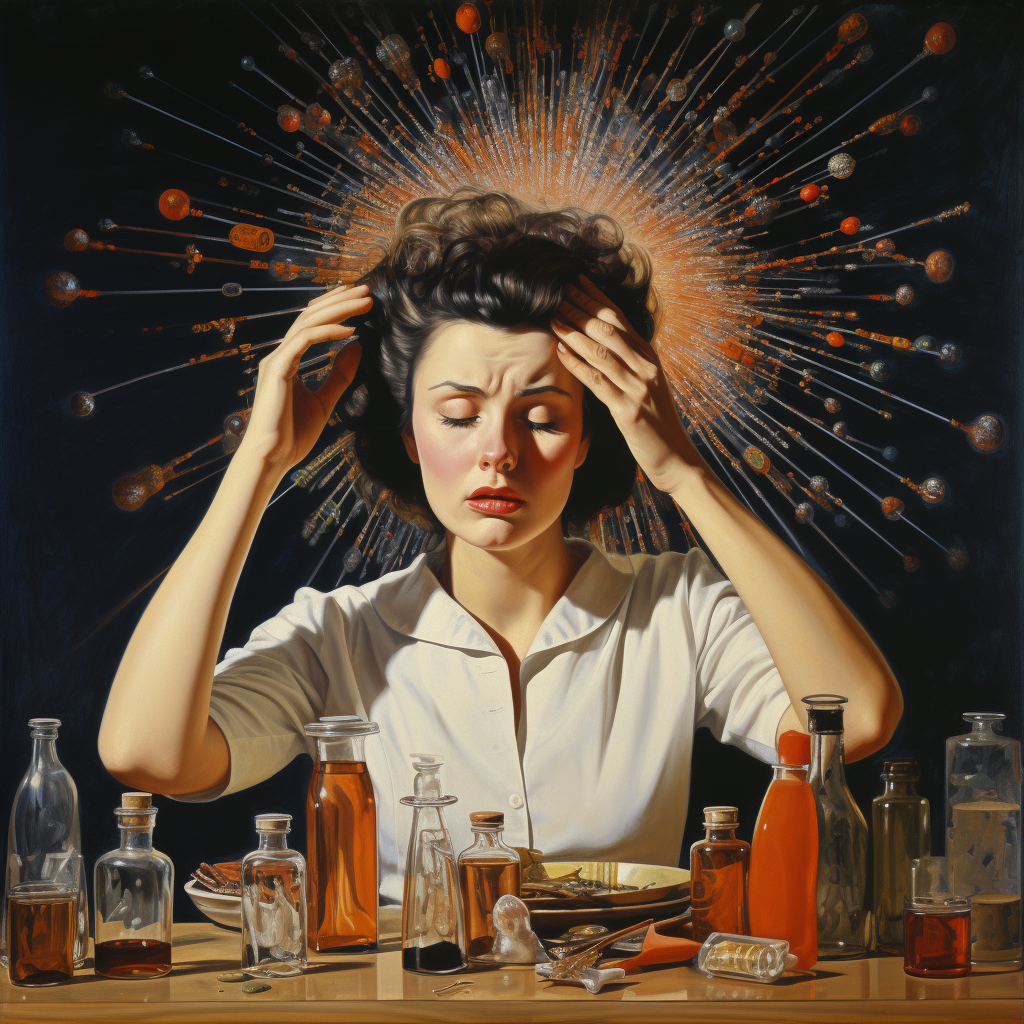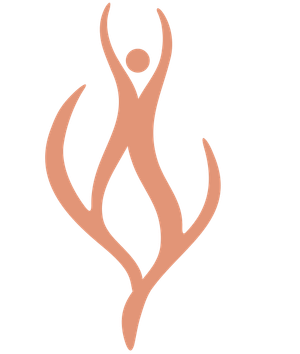Hormonal headaches are a common occurrence for many women. These headaches are often linked to hormonal fluctuations that occur during menstruation, pregnancy, and menopause. They can be debilitating, causing severe pain, nausea, and sensitivity to light and sound. Finding relief from hormonal headaches is essential for maintaining a good quality of life.
Migraines and tension headaches are the two most common types of hormonal headaches. There is a big difference between an average headache, where you can take an over the counter medicine and the pain subsides. Whereas a migraine on a whole different level. Migraines are characterized by throbbing pain on one side of the head, nausea, and sensitivity to light and sound. Tension headaches, on the other hand, cause a dull ache on both sides of the head and are often accompanied by muscle tension in the neck and shoulders. The types of headaches can be triggered by hormonal fluctuations and can be difficult to manage without proper treatment. In this article, we will explore the causes of hormonal headaches and provide tips for finding relief.
Understanding Hormonal Headaches

Defining Hormonal Headaches
We briefly went over a few types of headaches in our introduction. Hormonal headaches are a type of headache that is linked to hormonal fluctuations in the body. They can occur in both men and women, but are more common in women due to their monthly menstrual cycle. Which causes fluctuations in hormones. Hormonal headaches can be classified into two types: migraines and tension headaches. Sometimes it is difficult to tell the difference between a strong stress headache and a migraine.
Migraine Characteristics

Migraines are a type of headache characterized by intense, throbbing pain, usually on one side of the head. They can last from a few hours to several days. Symptoms can include nausea, vomiting, sensitivity to light and sound, and sometimes visual disturbances known as aura.
Hormonal Association
Hormonal fluctuations are a well-recognized trigger for migraines, especially in women. These fluctuations often occur during menstruation, pregnancy, menopause, or as a result of hormonal medications like birth control pills or hormone replacement therapy.
The estrogen connection is particularly notable. Changes in estrogen levels can influence migraine occurrence. For instance, some women experience migraines just before or during their period, when estrogen levels drop.
Tension Headaches Characteristics

Tension headaches are the most common type of headache. They are often described as feeling like a tight band around the head. These headaches are typically mild to moderate in intensity and are not aggravated by routine physical activity, unlike migraines. Symptoms include pressure or tightness on both sides of the head, and sometimes neck or shoulder pain.
Hormonal Association
Like migraines, hormonal changes can also trigger tension headaches. However, the direct link between hormones and tension headaches is less clear than with migraines.
Stress and hormonal changes often go hand in hand, especially in contexts like premenstrual syndrome (PMS), menopause, or periods of hormonal fluctuation. Since stress is a major trigger for tension headaches, hormonal changes indirectly contribute to their occurrence.
Causes and Triggers
Now that we have defined the differences of a migraine and tension headache, let's get into the specifics of how they are caused by changes in the levels of hormones in the body. In women, these changes can occur during the menstrual cycle, pregnancy, and menopause. Hormonal birth control and hormone replacement therapy can also trigger hormonal headaches. Basically, any major or in a few occurrences minor changes in the hormonal levels can cause them.
Other triggers of hormonal headaches include stress, lack of sleep, dehydration, and certain foods and drinks such as caffeine, alcohol, and chocolate.

Check out our hydration article
Symptoms and Diagnosis
The symptoms of hormonal headaches can vary from person to person, but common symptoms include throbbing pain on one or both sides of the head, sensitivity to light and sound, nausea, and vomiting.
To diagnose hormonal headaches, a doctor will perform a physical exam and ask about the patient's medical history. They may also order imaging tests such as an MRI or CT scan to rule out other conditions.
In conclusion, understanding hormonal headaches is important for finding relief from migraines and tension headaches. By identifying the causes and triggers of hormonal headaches, individuals can take steps to manage their symptoms and improve their quality of life.
Treatment Strategies
When it comes to treating hormonal headaches, there are several strategies that can be effective. In this section, we will explore some of the most common treatment options, including medications, lifestyle changes, and alternative therapies.
Medications
There are many medications that can be used to treat hormonal headaches, including over-the-counter pain relievers like ibuprofen and acetaminophen. In addition, prescription medications like triptans and beta-blockers may be recommended for more severe or frequent headaches.
It is important to work closely with a healthcare provider to determine the best medication for your individual needs, as some medications may have side effects or interactions with other medications.
Lifestyle Changes
In addition to medication, making certain lifestyle changes can also be effective in reducing the frequency and severity of hormonal headaches. Some lifestyle changes that may be recommended include, getting regular exercise, eating a healthy diet, getting enough sleep and managing stress through techniques like meditation or yoga.

Getting adequate sleep will lessen your chances for headaches & migraines
It is important to note that lifestyle changes may take time to have an effect, and it is important to be patient and consistent in making these changes.
Alternative Therapies
Finally, there are several alternative therapies that may be effective in treating hormonal headaches. Therapies such as acupuncture, chiropractic care, massage therapy and herbal supplements.
As with medication and lifestyle changes, I will say it again, that it is important to work with a healthcare provider to determine the best alternative therapy for your individual needs. Why? Because some alternative therapies may not be appropriate for everyone, and it is important to be aware of potential risks and side effects. The world needs you healthy and vibrant!
Overall, there are many treatment strategies available for hormonal headaches. By working closely with a healthcare provider and making certain lifestyle changes, it is possible to find relief from migraines and tension headaches.
Preventive Measures and Management
Diet and Nutrition
Maintaining a healthy and balanced diet can help prevent hormonal headaches. We recommend consuming foods that are rich in magnesium, calcium, and omega-3 fatty acids. These nutrients can be found in foods such as leafy greens, nuts, seeds, fish, and whole grains.

Check out our article about protein
It is also important to avoid triggers such as caffeine, alcohol, and processed foods. These foods can cause hormonal imbalances that may lead to headaches. I suggest keeping a food diary to help identify trigger foods and avoid them in the future. I know that really helped me keep track to foods that caused a trigger.
Stress Reduction Techniques

Stress is a common trigger for hormonal headaches. We recommend practicing stress reduction techniques such as deep breathing, meditation, and yoga. These techniques can help reduce stress and tension in the body, which may help prevent headaches.
It is also important to take breaks throughout the day to relax and reduce stress. We suggest taking short walks, listening to calming music, or practicing a hobby to help reduce stress levels.
Regular Exercise Regimen
Regular exercise can help prevent hormonal headaches by reducing stress and tension in the body. We suggest incorporating at least 30 minutes of moderate exercise into your daily routine. This can include activities such as walking, jogging, or cycling.

It is important to stay hydrated during exercise to prevent dehydration, which can also trigger headaches. We recommend drinking plenty of water before, during, and after exercise.
By incorporating these preventive measures and management techniques into your daily routine, you can help reduce the frequency and severity of hormonal headaches.
Until Next, Stay Vibrant!





